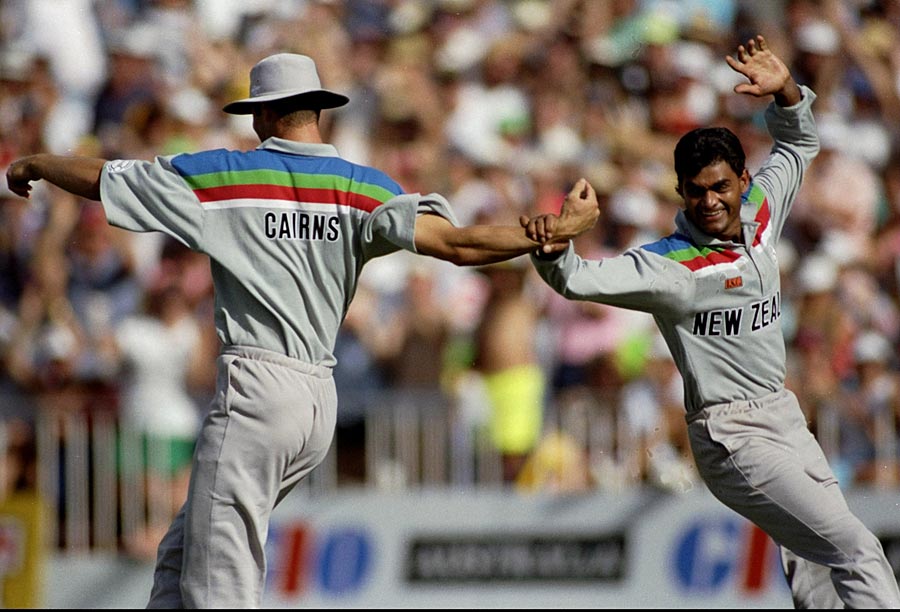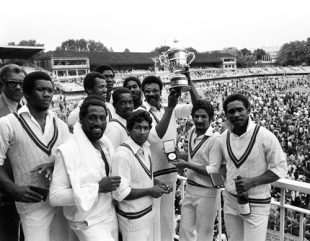Martin Crowe in Cricinfo

New Zealand gelled as a team int he 1992 World Cup but splintered thereafter © Getty Images
Teamwork, team spirit, team culture, team dynamics - all buzzwords that point to the same thing. Yet in truth it is the team "functionability" that must work if success is to be achieved and a legacy created. Sports teams are no different to business teams, except sport is played out in public and each individual player is under scrutiny, as much as the team's performance is.
In reality, most teams fail, if winning a championship or event or being ranked No. 1 is the measure they are judged by. Those few fortunate enough to hold the trophy aloft, let alone do it often and frequently, like the once all-conquering Manchester United, or the Australian cricket team of yesteryear, they are the ones that come together as one. As d'Artagnan famously said, "All for one and one for all."
There are thousands of opinions, hundreds of books, case studies and manuals on the subject worldwide. There are many ways to skin a cat. Yet really, when all is said and done, it is the simple methods of how people function best in everyday life that need to be executed in a sporting team environment. It comes down to how our relationships work in any form of life, and this points always to the ability to love, to talk, to listen and to commit. In short, to relate.
In my years of experiencing the good and the bad in relationships and teams, studying others, reading lots, and hearing grand and sad stories in all kinds of endeavour, the one thing that stands out more than anything is building and maintaining trust.
Trust stems from a willingness to openly share anything and everything. It is about not being afraid to show vulnerability, admitting mistakes and weaknesses, and generally and genuinely sharing the truth outwardly and honestly among the group. Trust rules the lot.
When it is not built, or is broken, then the essence of the team's functionality is lost. Great leaders and captains have been able to rely on this trust, once established, as the cornerstone to team success.
| Australia have always had the ability to work together even if one or two of the personalities clashed | |||
Ian Chappell, the great Australian captain, would easily speak his mind, using his open-door policy style, by buying his team-mates a beer and sitting them down at the bar, loosening them up a little and getting a natural flow of conversation bedded in. He was famous for building that trust within his all-conquering team of the '70s by simply using straight honest talking and listening. In this he helped create the environment to challenge and debate with each other.
This is incredibly healthy, the key being that the trust generated leads to open challenging discussions and passionate debate based on respect. It doesn't mean you have to hold hands when doing so, just simply to speak your truth "out in the open", be heard, and take time to listen in turn. The worst thing is to speak your truth behind the backs of the team, in particular to the media and opposition. This kills trust, and it kills the desire to continue to share. Once trust and openness are broken, there is no chance going forward.
If the first two are working well, it will go a long way to solving any commitment issues. Committing or buying into the team's work is about the desire to go to great lengths to perform your specialist role for your team's benefit. When team members are allowed to share the truth, there is a natural tendency to buy in to committing wholeheartedly to the decisions made by the team's leaders.
Without commitment there is no accountability. When all are in, it becomes easier to call team members on actions and behaviours that will assist the team cause. When accountability becomes understood, then so too is the need to focus attention to the goals and results of the team. Accountability removes the individual needs, like personal recognition and ego, from the equation.
Australia had a great handle on this with their dominance through most of the 1990s and much of the following decade. They have always had that ability to work together even if one or two of the personalities clashed. This was the open positive conflict working well. West Indies, under Clive Lloyd, showed a real theme to their togetherness, small nations becoming one, and they displayed a spirit unrivalled for 15 long years.
Through the '80s, New Zealand had a mixture of good and bad, but mainly positive functionality. Sometimes there was a lack of attention to team results and accountability, but overall there was an enduring trust, openness and commitment.

| |||
In my term as a Test captain, I didn't allow for enough open debate and sharing, and so we had little trust to start with, and the rest of the dysfunctions followed. My failure was in not generating enough open conflict to ensure everyone had a say, bought in, and truly committed. However, it did come slowly, so by the time of the 1992 World Cup, we had nearly all five functions working smoothly.
Sadly, rather than building on that success, we splintered dramatically, the catalyst being the bomb blast outside our hotel in Colombo in late 1992, an incident that split the team in two when six players and the coach, with families at home, left the tour. From then, as a team, we were damaged goods. Administrators got involved, wrongly, and developed hideous resentment. Over just a few months all the trust we had garnered started to evaporate.
By February 1993, factions were everywhere and our team dynamic was dead. The coach, Wally Lees was sacked for very little reason. Mark Greatbatch was inexplicably replaced as vice-captain, and therefore I lost my trusted lieutenant, and before long, after just one more Test in charge, my tenure as skipper was over too. The team spirit suffered.
My last seven Tests, as a mere batsman not knowing how to retire, were the saddest of all that I played, as I watched a team pretend it existed. There wasn't one ounce of trust. That positive team dynamic never rose again for New Zealand until Stephen Fleming began his own team-building with a young bunch of mates and an experienced and inspirational management, from 1998 to 2003.
The point is, anything can disrupt the dynamic, and so it's vital that whatever happens, or whoever comes into the group, the five functions must be quickly and often referred to: Motivation for maintaining the flow of attention to results; accountability; commitment; open, honest and respectful conflict; and sharing truths - these make the lifeblood of a team's fulfilment and longevity.